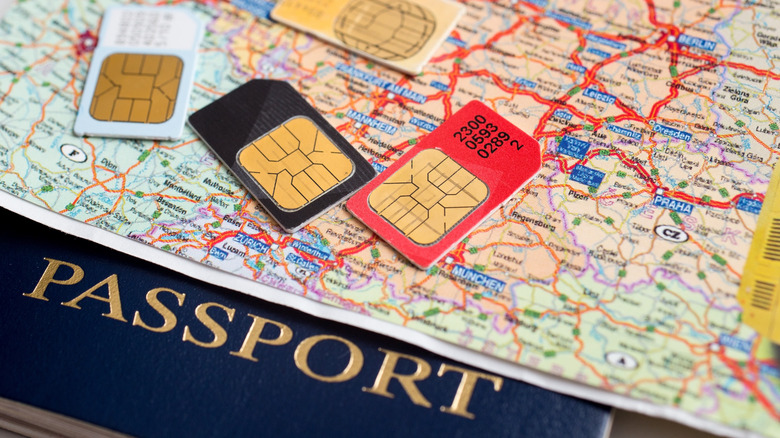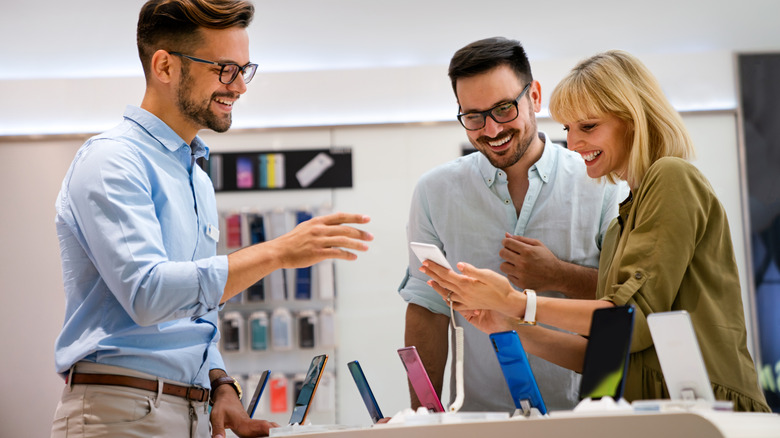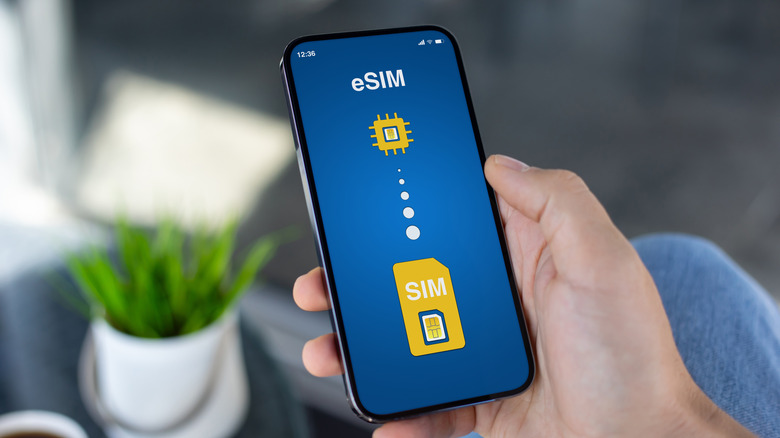Rick Steves Recommends Looking Into One Crucial Thing Before Buying A SIM Card While In Europe
Savvy travelers know that getting a local SIM card can save them a lot of money while in Europe. There's no need to get an international plan from your home provider. You can purchase a SIM card or an eSIM upon arrival, often at the airport. However, before you grab one and go, there's one crucial thing to consider.
Famous travel blogger Rick Steves recommends that you check the size of your SIM card before making a purchase. There are three basic types of physical SIM cards: standard, micro, and nano. Steves explains that many phones — particularly iPhones — use the two smaller options, micro and nano. Luckily, many European providers sell a Multi SIM, which has all three sizes in one. You pick your preferred size and pop it out along a perforated edge. However, it's still crucial you verify which sizes are offered. Each vendor is different, and if you check out with the wrong SIM size, it can be hard to swap it later on.
SIM size is merely one piece of a larger puzzle. There are several other questions you should ask when purchasing a physical or electronic SIM, especially if it's your first time traveling through Europe. To help you out, we've gathered the top tips for buying a European SIM card.
Top tips for purchasing a SIM card in Europe
If you want to feel connected the second you land, take advantage of the airport amenities once you arrive at your destination. Many airports have kiosks where you can purchase SIM cards. Before buying one, Steves recommends asking about texting and data rates since these can vary wildly. Specify exactly what's included in the plan, including calls and texts within the country, other European nations, and your home.
Some plans have coverage throughout Europe, while others are country-specific. Ask about the individual places you're visiting and ensure that there are no roaming charges. Meanwhile, there are also data-only plans if you solely need the internet. Having data means you can use local ridesharing apps, which is a great way to avoid Europe's most common taxi scams. If other people in your network have iPhones, you can send messages to one another through data only. However, iPhones aren't as common in Europe as they are in the States. To contact local businesses or make dinner reservations by phone, you'll want to include voice calls and texts (or SMS as Europeans say).
Finally, make sure the duration of your SIM card covers your stay. Plans range from a few days to several months. They can also be ongoing and merely require a top-up. However, some SIM cards do expire and it's not uncommon for them to be canceled after a year or so of inactivity. If you plan to return in the distant future, don't expect to use the same SIM.
Should you buy a physical or an electronic SIM?
If you've never used an electronic SIM, it may seem daunting. However, we assure you it's far easier than it might seem, and once you're on the eSIM bandwagon, it's hard to look back. These cards may be purchased at a store, through an online provider, or a third-party service like Airalo. The beauty of an eSIM is that you can buy it in advance and activate it the second you land. Steves says on his website, "You can add several SIM numbers to your device at once — without worrying about buying and installing a physical SIM card."
The primary downside to using electronic SIMs is that they are often pricier, even though Europe is known to have less expensive temporary phone plans than the U.S. You may get sticker shock when looking at the prices — in a good way! If you like the convenience of an eSIM but are traveling Europe on a budget, there is a workaround. Purchase an eSIM that lasts a few days, and buy a longer-term physical SIM card after arrival. This allows you to stay connected and get settled before shopping for the best deal.
When you're ready to buy a physical SIM, you can find them at mobile provider shops, electronic stores, newsstands, convenience stores, or vending machines. Don't be afraid to compare prices through different providers since they vary greatly. Depending on location, you may also need your passport to register the number. However, a bonus of purchasing a SIM card in person is that staff can help you set it up and answer all those burning questions.


